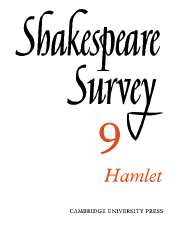Book contents
- Frontmatter
- Studies in Hamlet, 1901–1955
- English Hamlets of the Twentieth Century
- The Date of Hamlet
- Hamlet and the Court of Elsinore
- Hamlet’s ‘Sullied’ or ‘Solid’ Flesh: A Bibliographical Case–History
- Hamlet at the Globe
- Hamlet Costumes from Garrick to Gielgud
- Hamlet at the Comédie Française: 1769–1896
- The New Way with Shakespeare’s Texts: An Introduction for Lay Readers. III. In Sight of Shakespeare’s Manuscripts
- Shakespeare in the Bibliotheca Bodmeriana
- An Unpublished Contemporary Setting of a Shakespeare Song
- Garrick’s Stratford Jubilee: Reactions in France and Germany
- Shakespeare and Bohemia
- International Notes
- Shakespeare Productions in the United Kingdom: 1954
- The Tragic Curve: A Review of two Productions of Macbeth
- The Year's Contributions to Shakespearian Study 1 Critical Studies
- 2 Shakespeare’s Life, Times and Stage
- 3 Textual Studies
- Book Received
- Index
- Plate Section
The Year's Contributions to Shakespearian Study 1 - Critical Studies
Published online by Cambridge University Press: 28 March 2007
- Frontmatter
- Studies in Hamlet, 1901–1955
- English Hamlets of the Twentieth Century
- The Date of Hamlet
- Hamlet and the Court of Elsinore
- Hamlet’s ‘Sullied’ or ‘Solid’ Flesh: A Bibliographical Case–History
- Hamlet at the Globe
- Hamlet Costumes from Garrick to Gielgud
- Hamlet at the Comédie Française: 1769–1896
- The New Way with Shakespeare’s Texts: An Introduction for Lay Readers. III. In Sight of Shakespeare’s Manuscripts
- Shakespeare in the Bibliotheca Bodmeriana
- An Unpublished Contemporary Setting of a Shakespeare Song
- Garrick’s Stratford Jubilee: Reactions in France and Germany
- Shakespeare and Bohemia
- International Notes
- Shakespeare Productions in the United Kingdom: 1954
- The Tragic Curve: A Review of two Productions of Macbeth
- The Year's Contributions to Shakespearian Study 1 Critical Studies
- 2 Shakespeare’s Life, Times and Stage
- 3 Textual Studies
- Book Received
- Index
- Plate Section
Summary
Allardyce Nicoll in his British Academy lecture answers the complaint, with which those who survey the year’s work must have a sneaking sympathy, that Shakespeare is being buried beneath his commentators. Although we may share Louis Wright’s depression about the state of Shakespearian scholarship, “a great deal of energy . . . being wasted on minutiae that will add up to very little”, Nicoll points out that “many things accomplished in the past urgently need to be done again” and “many productive areas await proper exploitation”. He gives a number of examples—texts which demand proper editing, documents which await detailed examination, further investigation of Shakespeare’s imagery, and, he might have added, the imagery of his contemporaries, “the imaginative consideration of Shakespeare’s creative genius in the light of” his sources, the examination of Shakespeare’s style, the publication of an adequate dictionary of Elizabethan English, the provision of an ‘authorized’ text. Nicoll concludes, not unnaturally, that such a programme can be carried out only by team-work. L. C. Knights, on the other hand, offers a warning on the limitations of historical scholarship as exemplified by Virgil K. Whitaker’s Shakespeare’s Use of Learning. He emphasizes that in applying Elizabethan ideas to our study of Shakespeare
We should not approach them as Shakespearian scholars bent on reconstructing a merely historical background, but—paradoxically—that we should study them for themselves, responding to them as themselves actual and vivifying.
C. J. Sisson, meanwhile, gives the general reader a brief guide3 to Shakespeare and his critics. He is well-balanced and catholic in his sympathies, though he seems to regard some admired modern criticism with suspicion.
- Type
- Chapter
- Information
- Shakespeare Survey , pp. 132 - 140Publisher: Cambridge University PressPrint publication year: 1956



